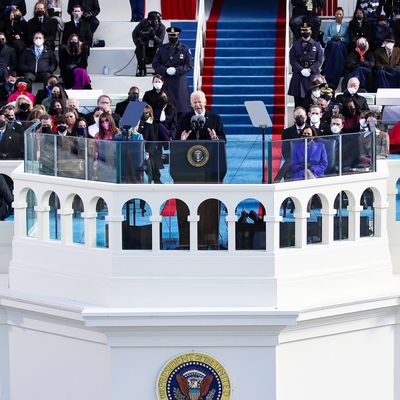
Joe Biden wants to unite America — in opposition to everything his 2020 opponent stood for.
This was the core message of the president’s inaugural address. And its internal contradiction mirrors that of Biden’s contemporary persona.
Uncle Joe began his bid for the White House as the standard-bearer of restoration. He launched his primary campaign by declaring that Donald Trump’s presidency was the first time in U.S. history that our nation had “walked away from” its egalitarian ideals. He insisted that Americans “can’t forget what happened in Charlottesville,” even as he invited them to forget the disenfranchisement of free Black men in the 1820s, the collapse of Reconstruction a half-century later, the unraveling of shared prosperity in the 1970s, and every other time the moral arc of the American republic had bent toward injustice. Against the darkness of Trump’s reign, Biden offered the blinding light of patriotic amnesia. Against the sweeping reform programs of his primary rivals, he presented poll-tested half-measures as badges of electability.
And yet: He also assembled a platform more progressive than any in the Democratic Party’s modern history. And his policy commitments only grew more sweeping as the COVID pandemic grew more devastating. By November, Biden was at once the candidate of a “return to normalcy” and that of a multitrillion-dollar green-energy transition. He was a candidate who insisted that America’s sitting president — whom roughly 40 percent of the public revered — was an embodiment of every value that the nation must reject and that America’s divisions weren’t as deep as they appeared.
Biden’s inaugural was riddled with such contradictions. But it also put them to productive use.
The address was festooned with reassuring banalities: America was a “great nation” full of “good people” who “can join forces, stop the shouting, and lower the temperature” and “see each other not as adversaries but as neighbors.” After all, “history, faith, and reason show the way — the way of unity.” In its tone and touchstones, Biden’s rhetoric had the aura of small-c conservatism. Barely a minute went by without at least one paean to God, country, or the military. The Bible was name-checked, psalms were quoted, prayer was requested. The word unity was invoked nine separate times.
But beneath these layers of patriotic pieties lay a governing vision that was both bracingly ambitious and inescapably partisan. Biden called on Americans to reject “extremism” — but also to recognize that this is a “time for boldness, for there is so much to do” about the “raging virus, growing inequity … systemic racism,” and “climate in crisis.”
He assured the nation that America had always been good but also insisted that it had denied Black people social equality for “400 years” and that the “dream of justice for all will be deferred no longer.” Most critically, while he pleaded incessantly for the nation to unite, he didn’t ask it to unite in opposition to a foreign enemy, but, rather, to the domestic forces of reaction and intolerance that were the true antagonists of the American story:
I know speaking of unity can sound to some like a foolish fantasy these days. I know the forces that divide us are deep, and they are real.
But I also know they are not new. Our history has been a constant struggle between the American ideal that we all are created equal and the harsh, ugly reality that racism, nativism, fear, demonization have long torn us apart.
Of course, racism, nativism, fear, and demonization have been the defining qualities of the American right for the past four years (if not four decades, if not two centuries). Biden’s speech addresses itself to the America he wishes to build, not the one that he inherits. Its rhetoric suggests that there is a bipartisan consensus in favor of democracy, racial justice, evidence-based policy-making, a green-energy transition, and greater economic equality — as though opposition to these things was found only on the fringes of American life rather than in the platform of the nation’s other major party.
In their answers to opinion polls — and behavior at the ballot box — the American swing voter demonstrates an affinity for conservative symbology and progressive policy (i.e., “Tory men and Whig measures”). Biden’s appeal is tailor-made for this constituency. It offers a spoonful of pabulum to make the progressivism go down.
This is sound messaging. Biden can’t conjure bipartisan consensus through sheer force of oratory. But he can plausibly use such rhetoric to grow the anti-reactionary majority to a point where the Electoral College’s biases can’t possibly deny its will.
But if Biden truly aims for “bold” action in the face of America’s harsh realities, he will have to go to war with the Republican Party that we have, not the one that he wishes we did.
In the speech’s most flagrantly self-contradictory passage, the president offered some cause for believing that he understands this. Describing the historic struggle between America’s ideals and its harsh realities, Biden said:
The battle is perennial, and victory is never assured. Through civil war, the Great Depression, world war, 9/11. Through struggle, sacrifice, and setbacks, our better angels have always prevailed. In each of these moments, enough of us, enough of us, have come together to carry all of us forward.
Here, Biden tells us that victory is never assured, then immediately insists that our better angels always prevail. Yet he follows this dollop of reassuring incoherence with the most cogent line of his speech: He does not seek the unity of all Americans, only that of “enough of us” to drag the rest toward justice. This is not a plea for reconciliation; it’s a call for a popular front.
And it’s one that Biden and his congressional allies must heed. If all 50 Democratic senators do not unite in opposition to the right’s incipient authoritarianism, our “better angels” may soon be outnumbered.






























